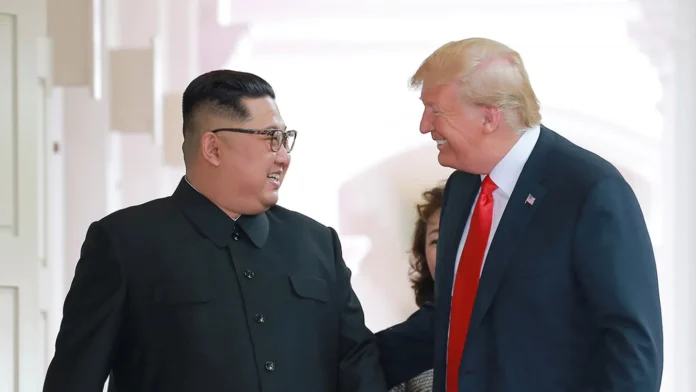President Donald Trump’s announcement this week that he wishes to engage with Iran prompted concerns in the security industry. A former national security adviser warned the president against developing a connection with the Ayatollah similar to Kim Jong Un’s.
Trump has portrayed his relationship with Kim as a “love” affair, but his first-term diplomatic attempts with the hermit country failed to prevent North Korea from expanding its nuclear program.
“On the question of negotiations, we’ll see where this goes,” said John Hannah, Dick Cheney’s former national security advisor and current Randi & Charles Wax senior fellow at the Jewish Institute for National Security of America.
Hannah spoke Thursday evening at a JINSA-hosted conversation in Washington, D.C., about Trump’s new plans to begin discussions with Iran.
“Trump and Kim Jong Un — that’s a worst-case [situation] — he comes out strongly against. He becomes involved and trapped in a negotiation. He is sweet-talked to. “It’s been dragged out for the rest of his presidency,” Hannah explained. “We make absolutely no progress in destroying or neutralizing North Korea’s nuclear program.
“That’s the nightmare.”
Trump declared his decision to seek discussions with Iran to dismantle its nuclear program in a post Wednesday night on his Truth Social media site, where he proclaimed his goal for a “Verified Nuclear Peace Agreement.”
“We should start working on it immediately, and have a big Middle East Celebration when it is signed and completed,” he said. “God Bless the Middle East!”
His post came one day after Trump issued an executive order authorizing the Treasury Department to launch a “maximum pressure” campaign against Iran via sanctions targeting the regime’s oil exports in an effort to prevent Tehran from pursuing its nuclear research.
However, following the order, he told reporters he was “torn” about signing the directive and that he was “unhappy to do it.”
The Trump administration has not disclosed who will lead these negotiations, how they will differ from the Biden administration’s negotiations, or what a new deal would include that was not included in the Obama administration’s international agreement under the Joint Comprehensive Plan of Action (JCPOA). That agreement was reached by the five permanent members of the United Nations Security Council: China, France, Russia, the United Kingdom, and the United States.
The so-called Iran nuclear agreement, which Trump withdrew out of in 2018, was also signed by Germany and the EU.
Hannah said Trump’s shift in position on getting a nuclear deal with Iran may be a bargaining technique, but he cautioned that “25 years of negotiations with the Iranians on the nuclear program have led nowhere except an Iran on the verge of acquiring nuclear weapons.”
The former national security advisor, together with the former special envoy for Iran and Venezuelan Ambassador Elliott Abrams, cautioned that the Trump administration faces a critical deadline when it comes to engaging in discussions with Iran.
In October, Russia, Iran’s main ally, will assume the president of the United Nations Security Council for one month, which may raise its own security worries.
However, another October deadline looms for international efforts to halt Iran’s nuclear progress. The capacity of the remaining states in the JCPOA to impose “snapback” penalties on Tehran will expire on October 18, 2025.
“There must be discussions between Trump and [Israeli Prime Minister Benjamin] Netanyahu about how long we will wait for this negotiation to drag on,” Abrams added, alluding to the Biden administration’s years-long talks that proved unsuccessful.
“I’m sure the Iranians will say if you impose snapback [sanctions] the negotiations are over, and we will leave the nuclear nonproliferation treaty.”
Iran has regularly violated the pact, notably in recent years, but proponents of a nuclear agreement maintain that it is a crucial instrument for keeping Tehran engaged in nuclear nonproliferation debates.
However, Abrams warned that the United States and Israel should conduct military drills to inform Iran of the risks it may face if it pursues nuclear development.
Retired Israel Defense Forces Major General Yaakov Amidror reiterated this opinion, saying he believes Iran would not fully disregard the danger of US-Israeli attack force capabilities since it relies on the lawful components of its nuclear program for economic stability.
On Friday, Iran’s Supreme Leader, Ayatollah Ali Khamenei, denied the notion of further discussions with the Trump administration.
